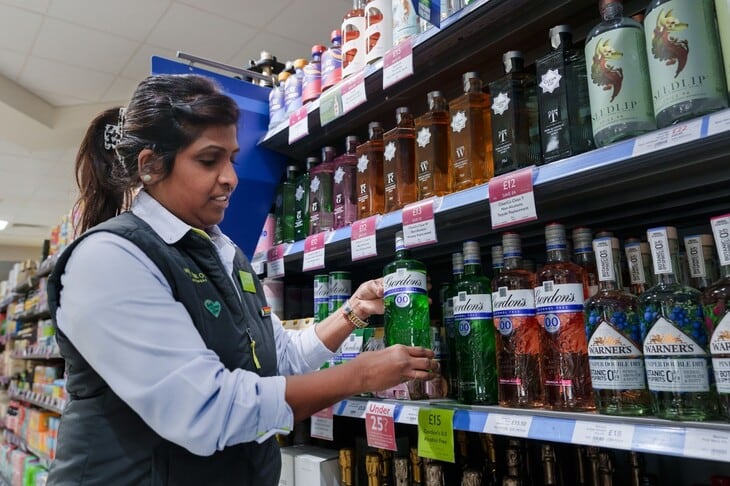Key takeaways
- Drinking experiences for Gen Z are about more than just consumption; they seek authenticity and brands that align with their values.
- Traditional marketing strategies are ineffective with Gen Z, who are shifting towards digital and social media platforms for discovery and purchasing.
- Social media acts as the new digital shelf, where Gen Z discovers and researches brands before purchasing, emphasizing the importance of transparency and seamless e-commerce.
- With so many brands out there, brand loyalty among Gen Z needs to be earned
Tracking Gen Z’s alcoholic drink preferences is essential for brands and marketers because this generation is reshaping the beverage industry with distinct values and behaviors.
Unlike previous generations, Gen Z drinks less frequently and more mindfully. Many choose to abstain entirely or drink only occasionally, driven by concerns about mental health, addiction, and wellness.
Gen Z favors drinks that align with their lifestyle: convenient, flavorful, and ethically produced. Ready-to-drink cocktails, spiked seltzers, and tequila-based beverages are especially popular, reflecting their desire for authenticity and artisanal quality.
But here’s what’s key: traditional marketing strategies are less effective with Gen Z, and the way the purchase alcohol shows a strong shift to.
Economically, Gen Z is gaining purchasing power and influencing market trends. Their preferences are driving innovation and forcing legacy brands to adapt. Companies that fail to respond risk losing relevance.
Here’s what Gen Z is looking for.
Taste
Gen Z wants drinks to taste good. That might sound like stating the obvious, but there are new dynamics to what Gen Z are looking for over previous generations.
“Taste has always played a role, but Gen Z approaches it differently,” said Zach Polema, Senior Vice President, Strategy and Insights Center of Excellence at Southern Glazer’s Wine & Spirits.
“They’re not necessarily bound by tradition, many are seeking out wines with unexpected flavor notes or spirits with infused botanicals.
“They’re open to both bold and nuanced profiles, gravitating toward expressive, layered tastes like citrus-forward vermouths or barrel-aged bourbons with a hint of spice.
“Gen Z’s curiosity is driving demand for elevated experiences, whether in a natural orange wine or a craft-distilled gin.”
And for Ruby Honerkamp, CEO and Co-Founder of RTD alcohol brand Talkhouse Encore, the concept of taste goes down to ingredients that don’t taste synthetic, but offer real flavor.
“Taste has always been an important factor across generations when choosing a beverage, but what sets Gen Z apart is how much more intentional they are about what tastes good and why,” she said.
“For them, it’s not just about flavor, it’s about ingredients, quality, and authenticity. They’re looking for drinks made with real fruit or natural ingredients that taste just like a cocktail they would order at a bar.”
Talkhouse Encore went so far as to create digital twins with Panoplai, an AI-powered research platform, creating a virtual version of the Gen Z Talkhouse Encore consumer as it investigated what Gen Z wants.
“We found that 80% of Gen Z choose canned cocktails primarily for the taste, but their idea of “good taste” means real ingredients, transparency, and ingredients that align with a more mindful, health-forward lifestyle," she said. “They’re not just chasing flavor - they’re choosing drinks that reflect how they want to feel and live.”
Experience
For Gen Z, a drink isn’t just a drink. It’s an experience.
“Gen Z isn’t just sipping, they’re seeking,” said Michael Pavone, CEO of Philadelphia headquartered marketing and advertising agency quench. “We’re seeing that in the trends that we’re tracking now and in the past. They’re drawn to experiences, so drinks that tell a story or align with their values, like craft cocktails or sustainable brands, are their go-tos. They want authenticity paired with a bold taste adventure.”
For Zach Polema of Southern Glazer’s Wine & Spirits, that experience could take many different forms.
“For Gen Z, drinking wine or spirits isn’t just a transaction, it’s an experience,” he said.
“They’re drawn to brands that show up on social media with transparency, style and purpose. Whether it’s through augmented reality (AR)-enhanced packaging that shares vineyard details or limited-edition collabs with cultural tastemakers, they want more than just a pour, they want a point of view. The experience behind the bottle must match the quality within it.”
The new digital shelf
Brands need to think about where their touchpoints are with consumers.
“Social media is quickly becoming the new digital shelf,” said Zach Polema of Southern Glazer’s Wine & Spirits.
“Discovery happens on Instagram, TikTok, and via influencers, often long before a bottle hits traditional retail outlets. Gen Z expects seamless e-commerce pathways, whether through a brand’s own site, a third-party platform, or delivery integrations. As state laws evolve, direct-to-consumer models and mobile-first experiences will only gain traction. As such, wine and spirits brands need to make the digital buying experience as straightforward as possible to reach Gen Z.”
“Gen Z is completely reshaping how alcohol is discovered, chosen, and enjoyed,” said Ruby Honerkamp, CEO and co-Founder of Talkhouse Encore.
“They’re drinking less frequently, but with much more intention. It’s no longer about grabbing whatever’s on the shelf: it’s about finding products that align with their values and lifestyle. They’re doing their research, looking at ingredient lists, watching reviews on social, and often discovering brands online long before they see them in a store.
“From what we’ve seen in our research with Panoplai, this shift is only going to continue. Gen Z is gravitating toward premium, lower-ABV, spirit-based options, because they want balance—they want to enjoy a drink without overdoing it. Transparency around ingredients and sourcing is becoming more important, and RTDs are really leading the charge as a format that feels convenient, intentional, and reflective of how they want to socialize.”
Brand loyalty
Social media is the new digital shelf, and we know Gen Z looks to influencers and Instagram for the next big thing.
But to assume that translates into straight-forward brand loyalty is a very simplistic reading of the situation. Think about how many other brands and how many other influencers each consumer sees in every single social media session.
“Gen Z is loyal: but it’s earned, not assumed,” said, Zach Polema of Southern Glazer’s Wine & Spirits.
“They’ll return to a favorite spirit or wine label if it consistently delivers quality, resonates with their values, and stays relevant. But they are highly exploratory, often discovering new brands through social media or word-of-mouth.
“In fact, Gen Z consumes at least twice the number of brands annually compared to older generations and is active in 3–4 more beverage categories than many of their parents were.
“Recruiting a consumer is no longer a one-and-done moment, brands must continually re-recruit Gen Z to stay relevant and secure long-term loyalty. Cultural awareness, adaptability, and transparency aren’t just nice to have, they’re the foundation for keeping this generation engaged.”
Getting it right: What not to do
The marketing playbook of the past is not necessarily the right one for the future. Brands that don’t get in right won’t just turn Gen Z off: they’ll alienate them forever.
“Gen Z is turned off by outdated marketing tactics, anything overly gendered, elitist, or tone-deaf,” said, Zach Polema of Southern Glazer’s Wine & Spirits.
“Loud, gimmicky branding and legacy prestige without purpose often fall flat. They want elegant, intentional storytelling with modern design cues, clear sourcing info, and real-world impact. A flashy label doesn’t cut it anymore for a generation that wants authenticity.”
Again, fancy and overdone is out, says Michael Pavone, CEO of quench.
“Gen Z isn’t impressed by tradition for tradition’s sake,” he said. “Fancy labels or legacy brands don’t hold the same weight unless they resonate with their experiences. They gravitate away from unrelatable, status-centric marketing and toward products that speak to inclusivity and authenticity.”
That comes down to everything: whether that’s the ingredients used or flashy branding, says Ruby Honerkamp of Talkhouse Encore.
“Malt-based drinks, excessive sugar, and ingredients that aren’t transparent or recognizable are less appealing to them. They also shy away from high-ABV options that feel heavy or overwhelming. For them, drinking is about balance and control.
“Gen Z also values honesty and connection, so brands that come across as fake or overly flashy without substance just don’t resonate. They want products that reflect their lifestyle and values: clean ingredients, transparency, and a vibe that feels real.
“Authenticity is everything in this space.”



